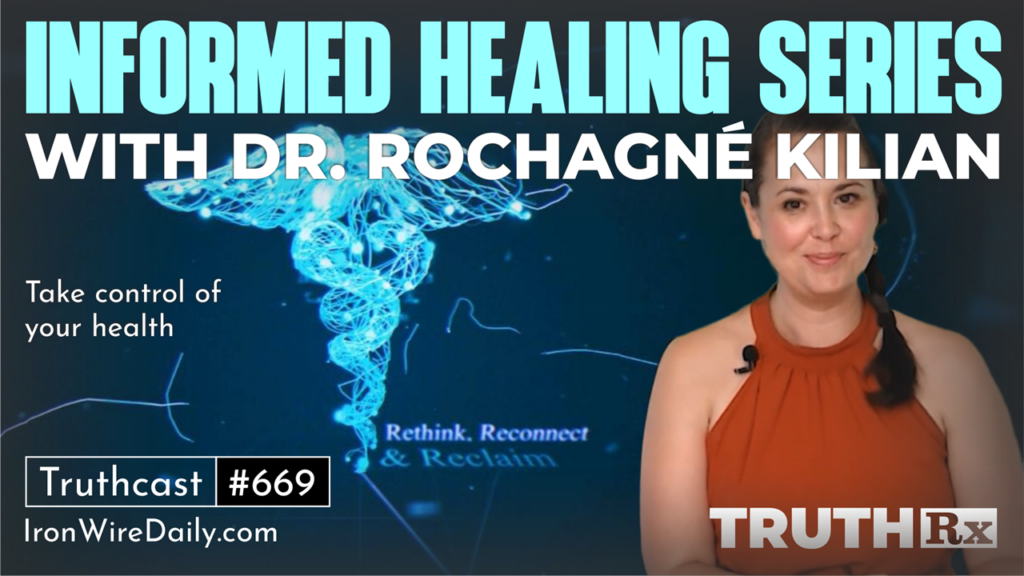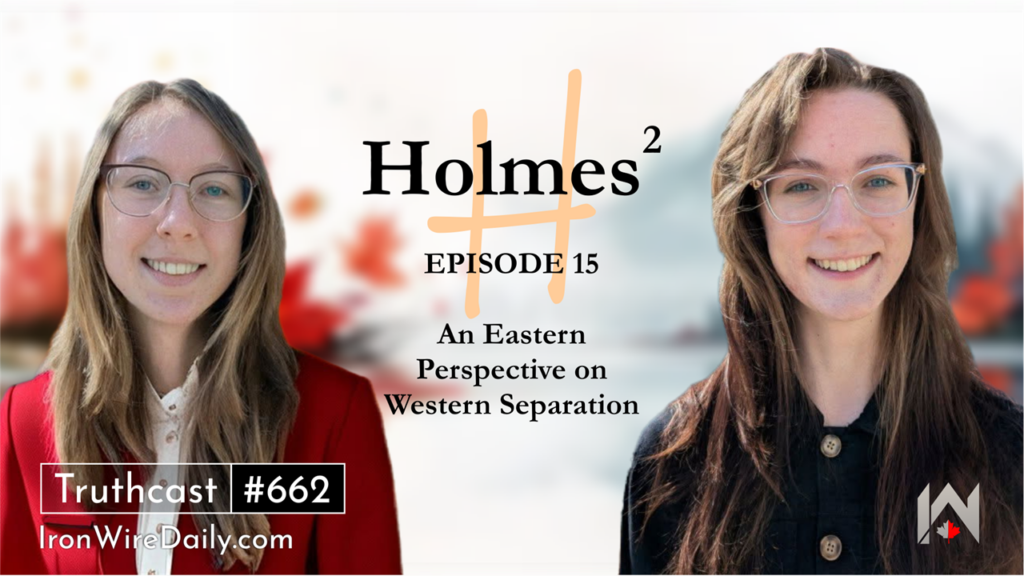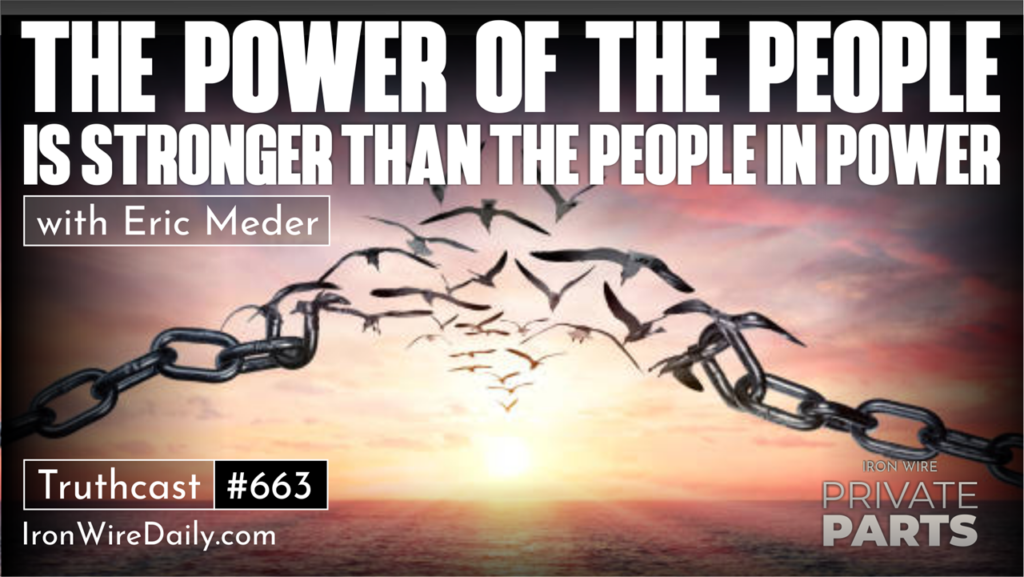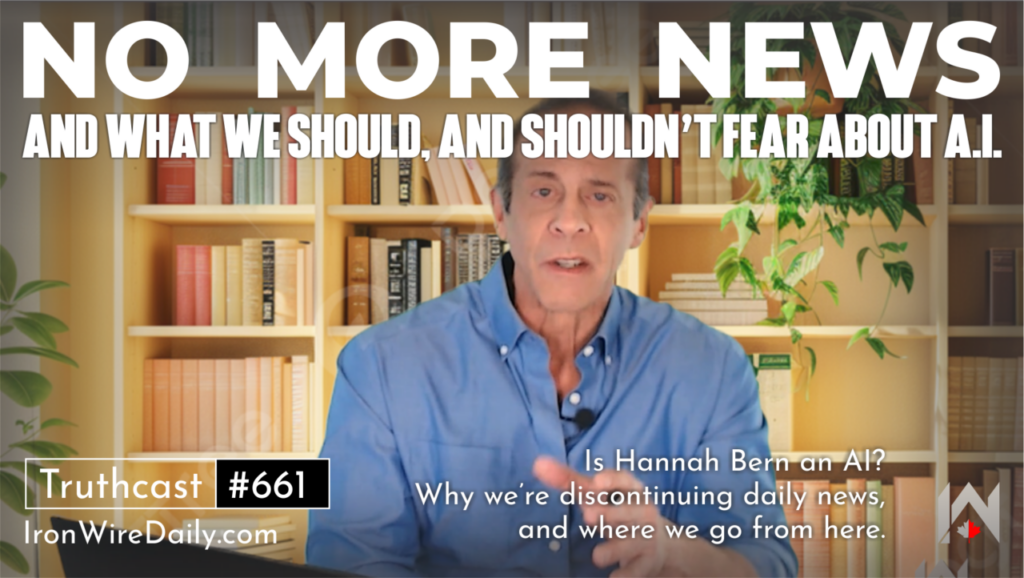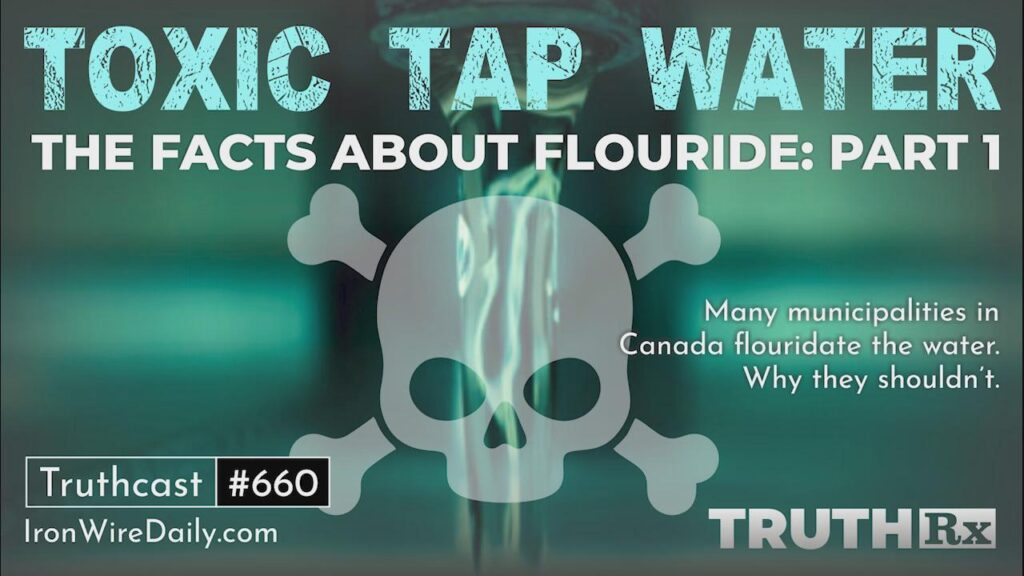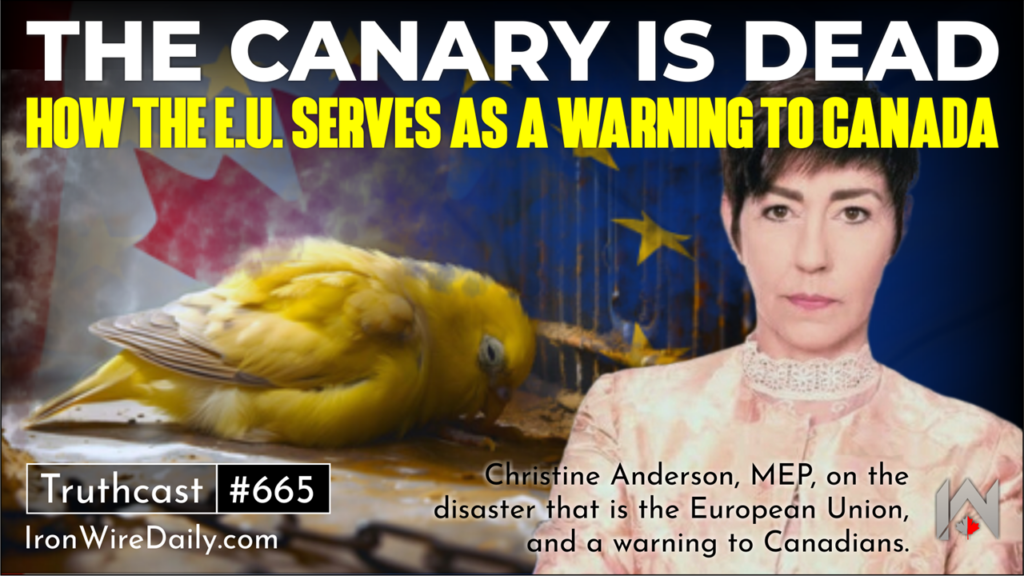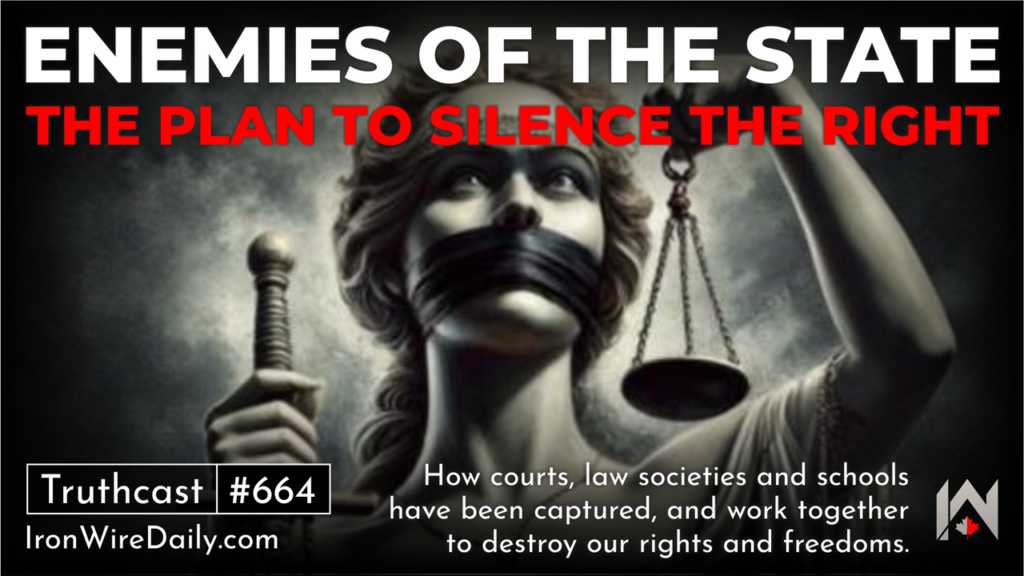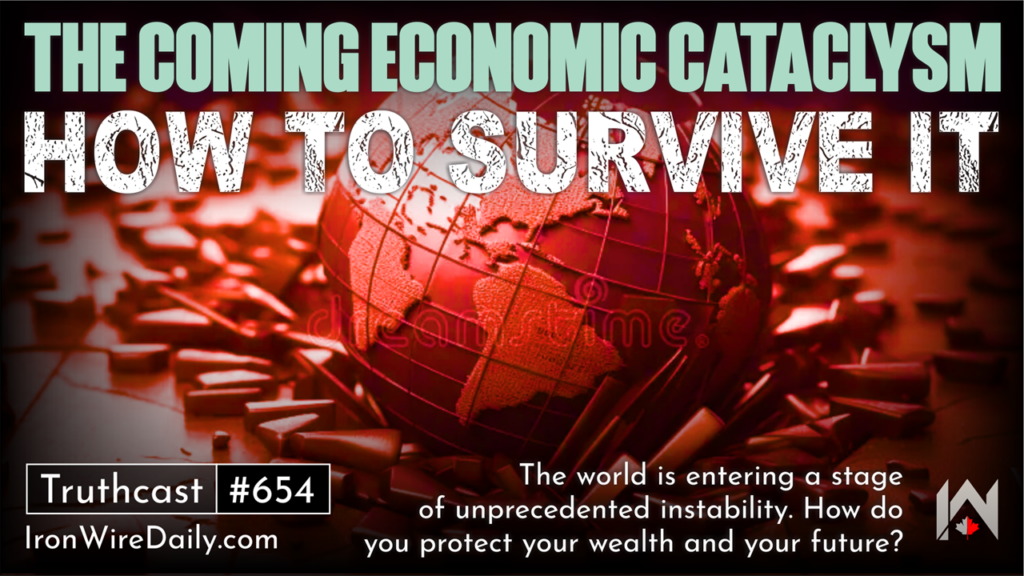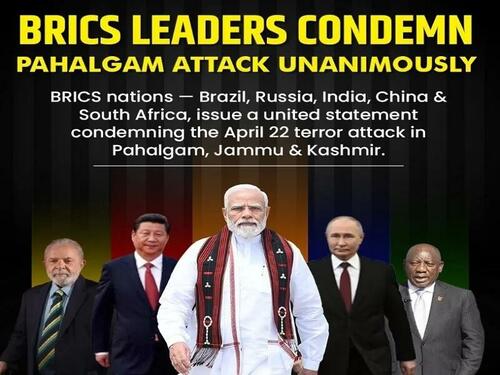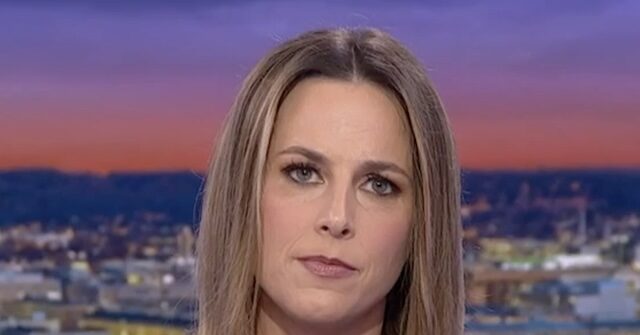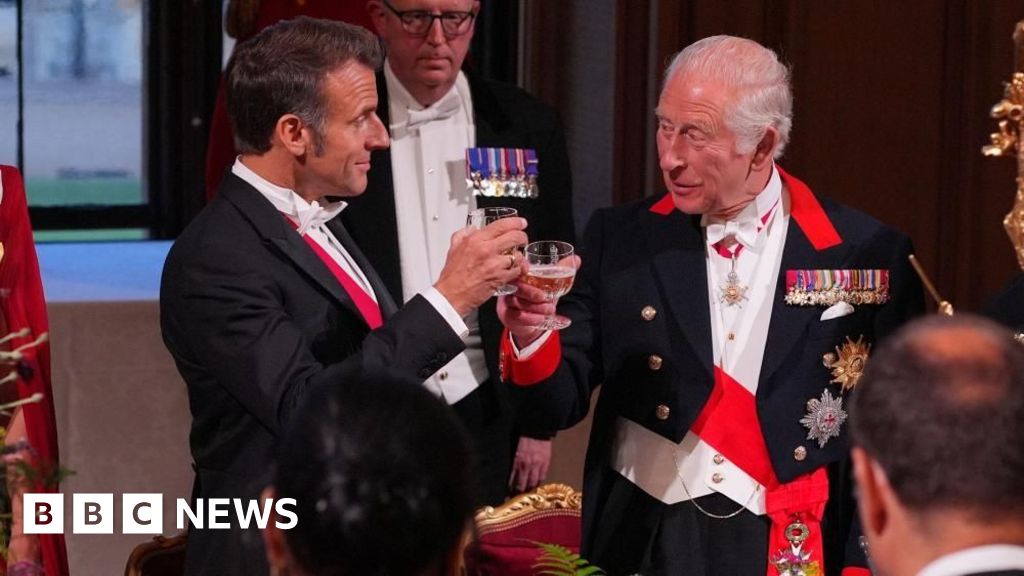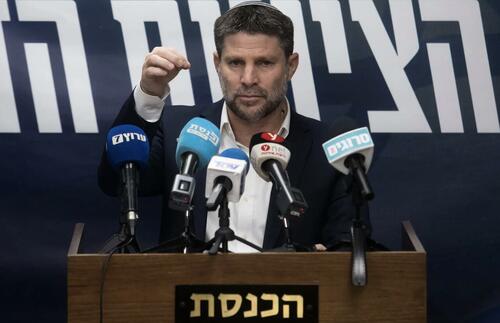Hi, I'm Madison Holmes. And I am Maycee Holmes. And you're watching Holmes Squared. Oh my god, the way we said that. Well, you did a weird accent, okay? I didn't. I just said it normally. You know, I did it with a twang and the suits are all Burton. Albertan. Long squared. Yes. Yes, exactly. I guess that is a good place to start, um, in the sense that this is in Alberta. I agree. Well, this is our first segment on, um, the date. What are we calling it? This is Iron Wire Daily. Iron Wire Daily. Thank you. So Holmes Squared was created by the creator of Iron Wire Daily, Will Dove. So all credit goes out to him for the name in the segment. Thank you, Will. Thank you, sir. So I think that we can start then by just introducing people and getting them to know, I guess, who we are. So I kind of just gave you a taste. We are Albertans. I'm Maycee. I'm 20 years old. Maddy? Madison. I'm 22 at the moment. Yup. There is a significance behind the age. Is there? Actually, yes, there is. I'm sorry. I had to wait for my brain to ping. You guys will understand what that means as we go, as you guys get to know us more. I guess, so something that I thought would be good for us to kind of explore is, well, some people do know us and they know our family. For those who don't, we are largely involved into the freedom movement, which to some is a rarity for young people to be involved. Like the Will Doves of the world who took notice, I guess, enough to give us our own segment. So clearly, we're doing something interesting that warrants that. And so I guess the next question would be, why us? What do we do? Not because we're something special, but we're something special enough. So what? What is it we do? What is it we do? Yeah. Yeah, I guess that's a fair question because having this segment, there are, we've met other youth, but there's something about whatever it is that we do, both as individuals and as a clan. Because like you said, everywhere we go, it is not the QAnon sense, but where we go, one, we go all a little bit. And because we're a family of seven and most people know, they've heard of Maycee and Madison, sure. But they know that family. It's like, oh, you're that family. You're that Holmes family. Yeah, that's so... We did not plan that one. No, we planned the intro, but not from you. But the question of what we do, what I do and what Maycee does is also what the family does. So you're not going to see that as viewers. You're going to see our individual idiosyncrasies as Maycee and Madison Holmes, the sister dynamic duo. But most of what we are has also been the compilation of our family and what they do. So that context will just always be there. When I've been criticized before by people for, they're like, how are you? And then I immediately start talking in the royal we. That is so true. It's true. We are a bit cult-y that way. Cults, for people who don't know, the word originates from culture, actually. Yeah. When, although a lot of people, including us, use, oh, that's a cult. Because how it's demonstrated is usually the sketchy, ritualistic cults of this secret society. Yes. It's also, in another light, a culture of sorts. And our family does have its own little mini culture. But where is that going with that? Well, I mean, it answers into the question of what it is that we do. And what we do is, again, as you alluded to, the whole family does. So I guess what makes us different is the fact that on a daily basis, me, Maddie, my dad, primarily, we all really want, like, sink our teeth into podcasts while we're at work. And we try to understand what's going on in the world. And that's a lot about what we're going to be talking about with you guys. But this is just an introductory segment of, like, what's some of the stuff that we're learning? And why is it important to talk about? And how does it play into the context of what's going on, not just where we live in Alberta, but in the rest of the world? And I think that that's something that we want to definitely touch on. I think the thing that the next question more so is, is a lot of the times people ask us, how do you get youth involved? Because you're going to see through demonstration that we are. We don't need to prove that. You're going to see through what it is that we talk about, that we're trying to figure it out and learn together. That's just always going to be there as we progress forward. But I guess, how do you get youth involved has been the major question that a lot of people ask us. And I think that the reason why we're sitting here today trying to answer that question on behalf of other youth that are actually in some ways involved and then others that are not, is because we've taken on the responsibility of paying attention to ourselves and paying attention to the world. And there's a certain frequency and care as to why you would even go listen to a podcast in the first place to try and figure out questions like economics and questions like geopolitics and the brain and all these things that we're trying to understand as a collective, not just us young people, but all the people out there watching this. It's like you're listening because you're trying to solve a problem. You've taken responsibility for it. And the problem that we face when we're interacting with youth is that they sometimes either lack the confidence in their own head to feel like they can do what it is that we do. And in the sense of like, how can you manage a job and your life and still listen to podcasts and try and learn all these complicated topics? And like, how can you do that? And I just, I don't think I could do that, you know? But the problem is that they don't understand their own mind and they don't understand that that is their own limitation that they've kind of put on themselves for a lot of different contexts as to how they are the way they are, the same way the context that made us the way we are. Yeah, I guess that's a good thing to look back on. So speaking of finances and things, I recently shared a podcast into a Telegram group and in the summary that I put, I'm 22 and if I can figure out treasury bond markets, so can you. And that's not a pat on the back, it's just a credit to the reality of time and context because when we kind of started this journey about getting involved, I was maybe 18 and it just started on, first of all, understanding electoral candidates, like who's running for president? Who's that and what do they do and what is their platform? Why is that their platform? Those were the, I didn't know treasury bonds, what that meant, let alone how that's affecting me, Madison Holmes, Mark Carney, potentially selling treasury bonds in the U.S. dollar and how that creates a currency war. What and why does that affect me at all? Well, being Albertan, it does affect me but the point is it took a long time to get here but Peterson's rule, incremental progress and as a family and as individuals, that's it. We go to work and we listen to podcasts, about two on average a day unless it's like a four-hour podcast, that's really complicated because that can be the case sometimes and it's during your everyday crap because life goes on. This is the one thing that everybody said about the trucker movement and truckers is that they do a lot of driving. You can get through a 30-minute podcast or you can get through a third of an hour and a half podcast driving 30 minutes. You know, it's doing the dishes if for those families who don't have a dishwasher, you can listen to a podcast doing that. You can listen to a podcast while you're folding laundry or while you're putting laundry in the load. Life goes on and we still do the everyday things to keep a family moving, keep yourself moving because there's all the maintenance of, you know, taking a shower, doing a workout to keep your body in shape, stuff like that. But we just keep plugging those things and do we understand? I know I don't when I listen. I don't understand every single podcast I listen to, especially when you listen to people like Matthew Aratt and Cynthia Chung from the Rising Tide Foundation and CanadianPatriot.org. He will drop 30 names of historical figures and I haven't heard one of them. You know, you figure out his 30 names, maybe I'd heard of one of them. But honestly, when I first started listening to his podcast, the answer was no. And I thought I remember the first podcast I listened to was on Canadian history. And I thought, how am I ever going to learn history? He just listed four events in my own country's timeline with 30 figures and I didn't get a single one of them. I'm like, I don't know if I can do this. And especially from me and Maycee did normal high school. Well, we did it online. We did online school, but it's still the standard Alberta curriculum. And I wasn't interested in history. I think even I started listening to those podcasts when I think I was 20. And I didn't like history when I did the first episode. Dad looked, listened to and went, this is super important, guys. You should listen to it. I'm like, okay. So I plugged it in my brain. Didn't understand half of it. But I just, I had faith. Not only in the process about incremental progress, just keep putting things in me. Keep going to the events, even though you might keep working out, even though I don't see my delts grow as fast as I want them to. Keep doing the push-ups, you know, 10 a day, 15 a day, 20 a day. And then eventually I'll see results. I did the same thing with podcasts because I did not understand a lot of this. But I also, this whole family dynamic thing, it was trust in my family. You know, Maycee said that they're trying to break down the family dynamic. And that's one of the big advantages I believe we have that other youth don't, even if youth are involved or they're listening to podcasts. Because we've met some academics and youth who they're politically engaged. They've been doing camp, they've been a campaign manager for five years and they knew the mayoral candidate for Calgary 10 years ago. I couldn't enlist you, even our 14 counselors for Calgary today, I can't. But what I, so that's something that those youth have on me and Maycee. But alas, it's not those youth that are there. They're politically involved, but we're here. We have the segment. And I think that's also partly because of the family dynamic, because we have something beyond of ourselves. It's, I'm not watching the podcasts just for Madison Holmes. I'm doing it because Maycee Holmes has some problems on occasion and she needs help. And so do I, but it's like, I'm trying to paint the picture that it's not just for me. It's like, obviously I struggle. I didn't know my brain when I was 17, 18 when we started this. We go through, we started with mainly psychology books. We did audio books and stuff. We started with the Jordan Petersons, the Gadsads, the- Jonathan Heights. Jonathan Heights. And that was really prevalent as 17 year olds and stuff like that. Cause our brain is in the middle of developing. So that's when hormones are heightened and all that jazz. But it was the understanding that my family, there are problems that they have sometimes and I might be able to help. And then it just grew bigger and bigger. It was you again that talked about the micro versus the macro. If you want to comment. That was what, so she's bringing up stuff that we were talking about before we even pressed record. But yeah, I think that that's, you definitely went on a long rant there, but sorry. Um, well, I think that there's, we understand that there's things that people have on us that they, that we don't necessarily completely know the ins and outs of, but we want to. And that's, that's what differentiates. And not that they don't want to make any accusations. But what I mean is that Maddie's not wrong. We've had a family dynamic. And so when we try and target our knowledge, it's family in mind. It's the global family. As well. And the community just to go a little bit smaller than that is, just how do we get involved to make these other people's lives better? And I think that that's one thing that people are, I guess our age don't necessarily wrap their heads around is they don't really do multi-generational thinking. Because if it wasn't for our family and our parents and the investment that they put into us. And then now that we're seeing our community put investment into us. If it wasn't for all of that, I think, I don't think that we would be where we are. But also we wouldn't understand ourselves. It would be still in that teenage kind of what we refer to. What's the identity? Yeah, identity crisis. Exactly. And the problem is, is that people don't understand when they're being a bit self-centered. And you later through context, you're going to see that we do a lot of hemisphere work. So when we say self-centered or we kind of call that like being more left hemisphere in your proclivity. And we'll go on a bit to touch on what we mean by that and why that's important to us as well. And something that we feel we can offer. But they don't understand that they're necessarily doing that. It's almost like just being caught in the magic trick. It's like, you're going like, ooh, and ah, and getting dazzled by what's being presented in front of you, which is your own illusion. But you don't understand how it's been set up for you. Like you don't understand that that's what you're doing. And here's how. And so that's what we're trying to target to our fellow youth can you understand your brain well enough to navigate all the complexities of life, but also the question of why should you even care at all? And that's the funny part is as you're learning how it works, simultaneously why you care just kind of parallel, like parallely, that's a terrible word, rises together. So I can't tell you why you should value it the same way we value it. I just can't. I feel like some... Actually, I don't feel like I know based on resonance. So you're just gonna feel value for it if you choose to or not. And if you don't choose to, that's also why we're here. Because it kind of just shows where your values lie. And that's something that we are definitely gonna be trying to point out to people is just where do your values lie? Because people our age will get caught in their own life, which is totally fair. And they're trying to figure out how to solve their problems or their job crises. Like if you're unemployed or, oh, I need to find a partner because marriage is important. Maybe based on my religion, based on my values, just let alone based on... Especially in the freedom community when you learn, which a lot of people watching this show, if you've been watching Will for a while, he has duly pointed out the whole depopulation agenda with the WEF and then the United Nations, NATO. And when you learn about that, we've heard so often mention of babies is like, oh, yes, make the babies to go against the people that wanted to populate the earth and convince you that there's scarcity. It's like, that's true. That's partly true, what you were saying. Well, that's a large part as well as what we're gonna talk about is part truth. Like we definitely gravitate towards the nuances of nothing is black and white or dichotomous. There's always the nuances of just considering time and context. And when I'm talking about some of the youth that we've been involved with, that sure, they know what's going on and how they're still a little preoccupied in their own world. I guess the next thing is then, well, why don't they kind of step out a bit to kind of see that they can encompass more into their world and actually, not that it's not gonna take work, but they can do it and why? Because it does impact their life. It's always hard to show somebody, well, how does it impact me now? It's like when you were, I guess, learning about the fact that the vaccines are harming people. Some people didn't come, the gene therapy was harming people. It's like some people didn't come to that conclusion until they got hurt. And that's what we're trying to do. We're trying to kind of go like, okay, before you get murdered or injured by whatever topic of discussion that we feel we can try and add our two bits on. And we damn well wanna make sure that it can be almost every topic because that's, again, a part of the responsibility we've chosen to take on. I wanna delve my brain into almost any topic that I can to try and help myself and then consequently help other people. But we're gonna try to figure out how do we set ourselves as humanity up for success before we get bit in the ass. Yeah, because the one thing you always say, Maycee, is, and it's funny because the first time you said it, I guess because I already had done it intuitively it was like, why would you even make the statement? What relevance is there? But you would say, what's the problem you're trying to solve? Or dad said he watched Robert Downey Jr. do an acting course way back when and one of the things he would ask himself was what's your action? And that question is really helpful for other people. And I think that's the value of it because when you know the value, you and I, we didn't ask ourselves, I mean, you can correct me if I'm wrong, but I didn't go, what's my identity? Who is Madison Holmes? I could tell you now and I could lay it out for you, but that's not the question I started with. I just started doing things that I believed would help me and thus other people. And then the identity that I could define for you today started forming from that. And so similarly with your question, what problem are you trying to solve? I just started solving problems, and not all problems are created equal. You know, what gender are my problem? That one's not exactly what I'm worried about solving, but what are finances or how does my brain work? How does my body work? How do I make sourdough? Because I want to feed my family, you know, little things like that. Those are little problems or what they compound. And then eventually when you, so when you first made the statement, what problem are you trying to solve? I had already started solving problems. So I thought, what point is that? But like you said, value. If people don't know why and they haven't started asking themselves what problem, they don't know how to start the practical solutions. And that's what makes us different. Even from, we're not podcasters by nature. I don't know if you could tell. But people watching this show, we didn't start here. We have something to talk about because we started getting involved first. I mean, how useful is it? That's the difference between the academic phenomenon. So we've met some youth and they can do more research than we can do. Or they can chew through a book in two days. That takes me and Maycee maybe a couple weeks. Partly because every time we read a book or listen to a podcast, we talk with one another as a family and being off of one another to negotiate, is this valid? And we ask all these questions. But there's the difference between the academic doing it alone and doing it for other people. The value of what they do, which I guess you can comment because you've also met a lot of youth who do this thing. And that's a big mode of attention difference. Well, mentioning mode of attention is probably a good thing because I guess when... Oh yeah, our mode of attention, I suppose, yeah. Yeah. Well, when we started, it's not like we were always awake to what was going on in the world. Like we said, there was... Maybe when we were younger, because we started out so young, it might've been the fact that you're trying to get the parents' approval or something. So maybe they were like, hey, this is pretty important. And then you're like, ooh, okay, I'll look into it. Sure, dad. Sure, mom. But you're not wrong. As you started doing the thing, you started to find more and more of the value innings. You were like, wait a minute, I feel like this... I don't know what it's going to be used for yet, but I feel like there might be some potential in knowing this information. And I think that that's something that hopefully we can offer in our discussions moving forward is we're just trying to figure out how do you create a better system than what we have now? It's essentially the question we're trying to answer. And we're trying to answer it using a bunch of other brilliant minds that are going to make up our own. And then we're going to criticize those minds. Yes, they have minds. And that's one of the things that we offer is we talk a lot about the brain and talk a lot about our hemisphere proclivities. And people might get a little bit snoozy the minute that you bring up something like the brain because they're like, I don't want to... My left brain does that and my right does that. My right's creative and my left's logical. And then they don't do anything with that information. They're just like, that's nice. How does that play any significance into my being? But when we started reading The Master and His Emissary, which is a primary literature and Professor Dr. E. McGill-Chris, we've been studying. His work is cool because it's a bit more of a contrary theory to average neuropsychologists. And the thing that I love that I kind of like try to peddle to people when I'm pumping up Gill-Chris's wheels is the fact that he's always like most neuropsychologists don't really take in their own psychology in trying to understand neuroscience. And Gill-Chris, in some respects, doesn't really talk too much about himself, but he is aware of where it is that he's failing and overstepping in some domains, but taking the risk to overstep and having that courage to still have that discussion regardless. Well, and when you write a book about the brain, using your brain because you can't not use your brain, like we know, we've never met the man. We would love to meet the man, but we know a lot about McGill-Chris by reading his book because without your conscious decision, you imprint yourself into this literature. Even him writing the book and apologizing for where he's going to fail ahead of time shows his own hemisphere proclivity and his openness. The thing that's always interesting to me is people, a lot of the times, have been saying that society is becoming a lot more schizophrenic. And the funny part is, why did you use a mental illness as your metaphor to describe where society is going? And then that is the question where we're like, oh, I think we have the answers to why people are using that metaphor. That's the thing that we're trying to pay attention to is like, what is the metaphors that people are using? And so it's like, okay, schizophrenic society. It's like, well, what is schizophrenia? What does that embody? Why is schizophrenia? Like, why is it doing this thing? First place, what are the intricacies? And then that's where a lot of our research and our understanding is going to try and play into solving that question. So that way we can understand, well, then how do we not perpetuate this cycle that we're in based on an individual basis? And then we play it out into the real world and try and go like, oh, like, look at the West now, Western society. Well, we don't want to. If I'm being left hemispheric on the micro basis where I'm, again, through more interaction, you're going to understand what we mean by that. So forgive me for not giving you too, too much context. We only have 30 minutes. But through my being more left hemispheric in my proclivity from, or in being more right hemispheric, what does that mean? It means what kind of attention have I decided to put onto any particular topics or onto the world in time, in whatever moments, what have I decided to put on? And then how does my decision play out into my actions? And then how does that happen on a nation level? Yeah, for example, you know, everybody knows the stereotypical abusive relationship between a wife and a husband, or boyfriend and girlfriend, or people living together generally. But you know, the typical abusive relationship. Well, as an Albertan, I think a very comparable relationship would be our little Alberta province to the entirety of Canada as a nation. So you can take, you know, individual dynamic relationships and literally personify onto the global scale. Because again, this global scale of a country, well, countries are run by people. And what do people have in common? Brains. So, and you don't get a collective without the individual and vice versa, the individual. So it's always micro can be macroed and vice versa. And this is backed by so much scientific literature, which is what I have pulled up on the screen here for, this is the sub stack or family sub stack at home with homes, connecting at home with homes. And we, the book Maycee just alluded to by Ian McGillicrest, it's called The Master and His Emissary. We've already started because that is our mission. We are servants of humanity. And in order to do that, we've started going through the book, talking about it as a clan. Cause again, we do most things as a clan. This is, this is us. That's me. This is Maycee. They got a little dog in the cart here, but this is how we go through life together. So that's, if people want to do some of the brain work, you can go there, get a headstart. Otherwise just keep watching us on this 30 minute segment, because I promise you, we will definitely be plugging and teaching you about your brain. And in tune, that means our brain. You're going to understand us better. You'll understand maybe your brother, your sister, your husband, even maybe your pets. That is so true. That's true. We have been experimenting. And let me just say, cats are so left hemispheric in their abilities. And we can talk about that. We can talk about. But for now, I think this has been a good introduction. I think that what I'd like to end off with is maybe giving people an idea of what we'd like to talk about next time. So Maddie and I have been doing a lot of deep diving into the Alberta or Canada's 51st state concept. And we've been trying to get our head wrapped around economics as well. So I think next time we might try and touch on that. Obviously if plans change, they change. I think that that's where we'd like to start because we love paying attention to what's going on right now that we can solve and paying attention to Alberta, which is where we live, which is where we're impacted the most. That we were talking about. A lot of people don't do things until they get inconvenienced. Well, we are inconvenienced by the fact that we live in Alberta. I don't mean that in a negative way. And that means we need to pay a lot of attention to it. And that's why we're trying to figure out, how does Alberta become better? So that way we can lead by example for the rest of the world to follow suit. And a lot of other places around the world are trying to do that and trying to figure that out as well in the midst of the chaos. And that's also what we will explore as well. So I think that that is what we'll try to aim for for our next segment. In one week's time. So thank you so much for giving us your time. And thank you, Will, for the first segment. And I guess, well, that's been Home Squared. Okay, bye.
